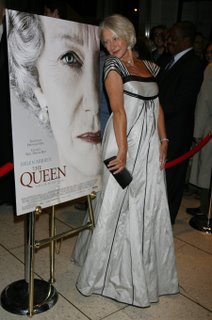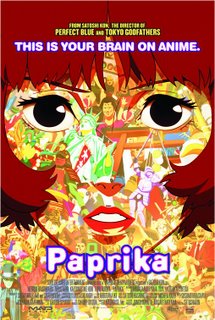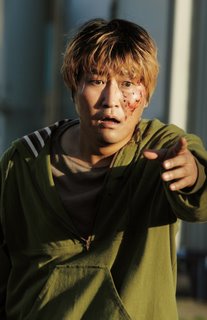 There were 28 feature films at the 44th New York Film Festival this year. I was able to make it to twenty. Here is the list of films put in order of my preference with links to my full review:
There were 28 feature films at the 44th New York Film Festival this year. I was able to make it to twenty. Here is the list of films put in order of my preference with links to my full review:Pan's Labyrinth (A) Fairytale horror film that explores the destructiveness of a harsh world balanced witht he beauty of an active imagination. Fabulous set design and darkly fantastical story well directed with only the tiniest moment of saccrine sentimentality.
Little Children (A-) Modern suburban fairytale for adults presenting a morale fable for checking our selfish, childish desires with some sense of adult responsibility. Fabulous acting and forceful directing balanced with a whimsical narrative without overt judgement forced from the script.
Mafioso (A-) Wonderful classic, buzarre comedy of errors as a Milanese takes his family home to Sicily only to get caught up in the crazy characters in the village and owing the mob a 'favor' that takes him to New York City. Crazy cast of characters and some wild, absurd moments equal fun.
The Host (B+) Gotta love a monster movie that shows you the moster right up front. Scary set ups and silly moments round out this creature feature so it is fun for the whole family (not toddlers, obviously; it's not Monster's Inc.)
49 Up (B+) Apted captures not only how we grow, live, love and lose throughout our lives but also how class makes a difference in how we acheive. I also serves as a nice reflective piece on the intrusiveness of cameras on personal lives. How often do you have to account for your life? Probably not every seven years.
Offside (B) Simple, amusing story of girls tring to get into a soccer game where their presence is considered not only intrusive but 'dangerous' to Iranian culture and sinsibilities. No overt message is forced in the script or directly but it comes out clear that this game of exclusion is really rather stupid.
Volver (B) Almadovar has fun with the female cast as they juggle their crazy lives and a dead body. Beautiful colors, lovely actresses, and competent directing keep this rather placid script from being boring.
Gardens in Autumn (B-) Goofy romp through Paris through life's ups and downs presented via a disgraced diplomat's movements and incidents. Strange events are balanced with a linear timeline and reoccuring characters to keep the audience guessing while not completely confusing everyone.

The Queen (C+) Television biopic of The Queen of England having a tough time balancing protocol and a sense of duty with her public's need for warmth, comfort, and connection following their loss of the beloved Diana. Helen Mirren gives a commanding performance but the script, directing, and supporting cast lacks the strength to take this beyond the simple cable channel fare. (Photo Credit: Dave Alloca)
Paprika (C+) Overload on pop culture anime dancing in the streets while you try to follow the sci-fi and fiml noir inspired mystery of who is misusing a dream device to play with people's nighmares to destroy the city.
Woman on the Beach (C) A needy director drags his assistant, and his girlfriend, along to a seaside resort to write but his libido gets the better of him as the three wander through a reason for interacting. Slow pacing may bore some but other will find it fun and kooky.

Inland Empire (C) Some movies are about one scene. In this repetative lot of moments and themes already captured, and better presented, in Mulholland Dr., the scene is the act of dying on a Hollywood street surrounded by homeless oracles. (Photo by James Israel/indieWIRE)
Triad Election (C) Watch mainland China try to control Hong-Kong mob movements to a visually beautiful sequence of meetings and hits. Unfortunately the direction is too loose and the script is in need of tighter editing.
The Go Master (C-) Another boring biopic of the Chinese Go master Wu Qingyuan who moved to Japan and survive great turmoil (wars, distracted by a religious cult) and only to have this film presented as if it were as exciting as a snails' race.
Marie Antoinette (D+) Too much dressing and not enough meat (or even salad) make this a condiment mess.
Falling (D+) Women acting like stupid teenagers when they 'reunion' at the wake for a dead teacher.
August Days (D) Mediocre director tries to recapture the moment he was inspired to create - during a camping trip with his brother. He is unable to reign in his own ego - casting himself and his brother in this recreation of a personal moment that should have better been left in the family scrapbook.
Syndromes And A Century (D) Another presonal history better left to family memories but this one is about the director's two parents workgin as doctors before they met - one in rural and one in urban Thailand - and had their sone bored us to death with this one.
Poison Friends (D) Annoying literature Ph.D. candidates bore us with their whiny lives under the influence of a maléfiques friend.
Bamako (F) Drone us to death with the guilt-inducing criticism of Afrikaners on Western counties (U.S.) and insitutes (World Bank) for wreaking destruction on their land and people. On an interesting note, it actually shows how boring typical court hearings are.
Things I skipped or missed:
Reds - I've seen it, it's good, but at 3+ hours I don't have the butt needed to sit through it again.
Our Daily Bread - documentary that seemed preachy in the progrma directory
These Girls - I typically don't like Egyptian films.
Climates - Typically don't like Turkish films
Insiang - Philipine film from 1976, couldn't work it with my schedule.
Belle Toujours - No one can replace Catherine Denuvue, and I tend not to like updates on original romance classics (Before Sunrise & Before Sunset, Scenes From a Marriage & Saraband)
Private Fears In Public Places - Typically I avoid Parisian romantic entanglement films but I may have missed out. Who knows, may have been an Amelie or something from Rhomer?
Knud Rasmussen - I wasn't a huge fan of Fast Runner and a blend of "fiction and documentary, ethnography and myth" didn't sound too interesting to me.























